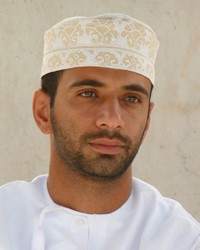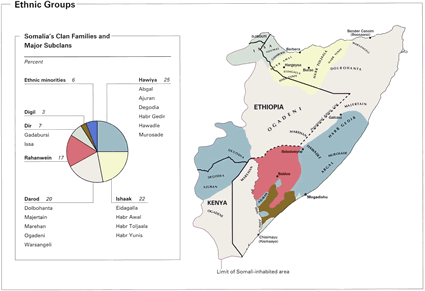Omani Arabs were among the first people in the Middle East to accept Islam. Arabs have inhabited the territory that is now Oman for thousands of years. In the eighteenth century, an alliance of traders and rulers transformed Muscat (Oman's capital) into the leading port of the Persian Gulf.
Omanis at one time had influence along the East African coast including what is now Kenya, Tanzania and Zanzibar. Large numbers of Omanis migrated to Zanzibar and the Swahili coast of East Africa during a time when that was seen by them as a land of opportunity. They prospered there until a bloody revolution forced most of them to return to Oman. Today some of them are fleeing Oman because of poverty, seeking employment elsewhere. It is unlikely that Kenya offers as good opportunities as some of the Gulf States closer to Oman.
Omani Arabs originate in Oman, but they live in five other countries including Kenya.
The Omani Arab live in extended family units. Their society is patriarchal, or male-dominated. The men do not abuse this authority because they believe that their families should obey them out of respect rather than fear. Also, there are clearly defined roles for both sexes. Even the children are given gender-specific duties. The men work outside in the fields while women work in the homes. Men and women often eat separately and never pray together. While men worship at mosques, women attend ceremonies conducted at home by female religious leaders. Marriages are generally pre-arranged by the parents. Children are a considered the family's greatest asset because they provide the parents with additional laborers and social security.
The values of the Omani Arabs in the city are not as strong as the values held in rural areas. The city-dwellers are concerned less with hospitality and more with property, wealth and education.
Omani Arabs were among the first people in the middle east to accept Islam.
Most Oman Arabs belong to the Ibadi sect of Islam, one of the religion's oldest and most traditional branches. Ibadi principles of puritanism and idealism have greatly influenced Arabs in surrounding countries. Family ties and religious traditions are strong.
The Oman Arab standard is to accept others on their terms. For example, they view anything less than excessive generosity as rudeness. Sunnis are welcomed by the Ibadis with Sunni greetings. Even Christians are tolerated by Omani Arabs in Kenya as long as they are not Muslim converts.
Omani Arabs are in need of jobs. Many of them in Oman are becoming impatient with their employment situation, so they are going elsewhere. Though they are more likely to go to Gulf State countries, a few are going to Kenya for work.
Pray that God will provide contacts, strategies, and wisdom for any mission agencies that are currently focusing on the Omani Arabs of Kenya.
Ask God to raise up prayer teams who will begin to break up the soil through worship and intercession.
Pray that strong local churches will be planted among the Omani Arabs.
Pray for a Disciple-Making movement to flourish among Omani Arabs in Kenya.
Scripture Prayers for the Arab, Omani in Kenya.
https://joshuaproject.net/people_groups/10378/DJ
https://joshuaproject.net/people_groups/10378/MU
https://www.thenational.ae/world/anger-grows-among-educated-but-unemployed-young-omanis-1.57016
http://www.everyculture.com/wc/Norway-to-Russia/Omanis.html
https://en.wikipedia.org/wiki/Omanis
https://en.wikipedia.org/wiki/Islam_in_Oman
http://realhistoryww.com/world_history/ancient/Misc/True_Negros/Assorted/Oman_Zanzibar_Sultanate.htm
https://www.youtube.com/watch?v=Z4azrNjFxng
http://www.aljazeera.com/news/2015/06/omanis-welfare-support-struggle-living-150624090104227.html
https://en.wikipedia.org/wiki/Omani_Arabic
http://www.angelfire.com/ak/tanzania/
http://www.globalprayerdigest.org/index.php/issue/day/2015/12/22
| Profile Source: Keith Carey |












